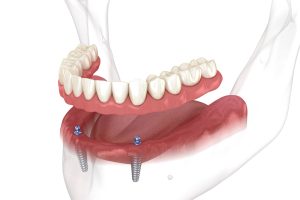What Are Implant-Supported Dentures?
Implant-supported dentures, also known as overdentures, are anchored to the jawbone using dental implants. A dental implant is a small titanium post surgically inserted into the jawbone to serve as the foundation for the final denture itself. Once the implant has fused with the jawbone, an abutment is placed on top of the implant. The abutment attaches the denture to the implant, providing a secure and stable fit.
There are two types:
- Bar-retained
- Ball-retained
In a bar-retained implant-supported denture, a thin metal bar attaches to the implant abutments, and the denture snaps onto the bar. In a ball-retained implant-supported denture, each abutment has a ball-shaped connector, and the denture has a corresponding socket that snaps onto the ball.
Supported dentures replace missing teeth, up to an entire arch, either in the upper or lower jaw. They’re typically recommended for people who have lost all or most of their natural teeth and have adequate jawbone density to support the implant. Unlike traditional dentures, which are secured to the gums using adhesives, implant-supported dentures don’t rely on the gums for support.
To schedule a consultation, contact our Madison dentist today at (256) 772-2626. If you live in the surrounding areas of Huntsville, Athens, or Decatur, we warmly welcome you to visit us at Madison Dental Care.
Addressing the Unique Needs of North Alabama’s Older Adults
Madison’s vibrant senior community deserves dental care that addresses age-specific concerns with dignity and expertise. Our practice features easy office access, comfortable seating, and appointment pacing that respects seniors’ needs. We understand the oral health challenges that often accompany aging and medication use common among Madison Senior Center participants and retirement community residents.
Seniors from throughout Madison, Huntsville, and Athens choose our practice for our patient, thorough approach and willingness to coordinate with other healthcare providers. We offer practical solutions for fixed-income budgeting while prioritizing treatments that maintain quality of life and social confidence for North Alabama’s active seniors.
Benefits of Implant-Supported Dentures
Replacing your missing teeth with implant-supported dentures provides multiple benefits, including:
- Improved stability and security: Because dental implants are anchored to the jawbone, the dentures don’t rely on the gums for support, making them more stable and secure than traditional dentures. This means that people who wear them can speak and smile with confidence, knowing that their dentures won’t slip and slide around.
- Preservation of the jawbone: When natural teeth are lost, the jawbone shrinks, which can cause the face to appear sunken and aged. However, with the help of an implant-supported denture, you can preserve the jawbone’s integrity.
- Improved quality of life: An implant-supported denture can help improve the quality of life for patients who have lost their natural teeth. They can restore the ability to eat a wide range of foods, speak clearly, and smile confidently, which can greatly improve self-esteem and well-being.
- Long-lasting: Implant-supported dentures can last for many years, sometimes even a lifetime, with the right dental care and maintenance.
- Natural-looking: These dentures look like natural teeth.
- Easy maintenance: They’re easy to maintain and clean, just like natural teeth.

Cons of Implant-Supported Dentures
While there are many benefits to implant dentures, there are some potential drawbacks patients should know:
- Cost: They can be expensive, with costs ranging from several thousand to tens of thousands of dollars.
- Surgical procedure: These dentures require dental implant surgery to place the implant posts, which can be invasive and require recovery time.
- Not suitable for everyone: Not all individuals are candidates. People who suffer bone loss may require bone grafting before implant placement, and people with certain systemic health conditions may not be good candidates.
- Temporary discomfort: There may be some temporary discomfort or pain associated with the implant surgery and the healing process.
- Risk of implant failure: Although rare, there’s a risk of implant failure, which can occur if the dental implant doesn’t fuse properly during the healing phase.
The Implant-Supported Dentures Process at Madison Dental Care
Since dental implants support these dentures, patients will undergo oral surgery. The entire process can take anywhere between three and nine months to complete. Patients will experience the following:
- Initial Appointment: You’ll schedule your first appointment so our dentist can evaluate your oral health, discuss your dental history, and determine if implant dentures are the best solution for your needs.
- Procedure: Our dentist will make a small incision in your gums and place the implant posts. Once all the needed posts are placed, they’ll close your incision with sutures, and you’ll be sent home to begin the healing process.
- Healing: Over three to six months, the posts will naturally fuse with the bone in a process called osseointegration. This is necessary to provide a stable foundation for your denture restoration.
- Placing Your Dentures: Once you have fully healed, you’ll return to our Madison dental office. The dentist will attach your custom dentures to the implants, providing you with a new, beautiful smile.
Are You a Candidate for Implant-Supported Dentures in Madison?
To qualify for implant-supported dentures, individuals need to have adequate jawbone density to support dental implants. If the jawbone isn’t dense enough, a bone grafting procedure may be required before we can place a traditional denture over the implant. Ideal candidates for implant-supported dentures should also be in good overall health and shouldn’t have any systemic conditions that would make them a poor candidate for implant surgery.
To find out more about your candidacy, contact our Madison dentist today. They’ll evaluate your oral health, discuss your smile goals, and provide the best options for your situation.
Frequently Asked Questions
Implant-supported dentures can last for many years, sometimes even a lifetime, with proper care and maintenance. You can increase the longevity of your restoration as long as you follow a rigorous at-home oral hygiene routine and visit your dentist twice a year for checkups.
It’s common to experience minor discomfort or pain after the implant procedure and during the healing process. However, any discomfort should be manageable with cold compresses or over-the-counter pain medications. Most people find that the benefits of these dentures far outweigh any temporary discomfort.
Unlike traditional dentures, implant-supported dentures are permanently anchored to the jawbone and aren’t removable. Only a qualified dentist can remove the restoration. Please don’t remove the restoration yourself, as this can cause serious damage.
The number of implants needed varies depending on the individual case. Typically, four to six implants are used to support a full arch of dentures, while two to four implants may support a partial denture.
Improve Your Appearance With Natural-Looking Tooth Replacements Near You
If you’re looking for a denture solution that doesn’t require messy adhesives or cause slipping and sliding around in the mouth, implant-supported dentures may be for you. For those in Madison, contact our experienced implant dentist near you today. We’ll help you determine the best option to replace your missing teeth and achieve your smile goals. Contact Madison Dental Care at (256) 772-2626 today to schedule your appointment.
Madison Dental Care welcomes patients from surrounding areas, including Huntsville, Athens, and Decatur.

